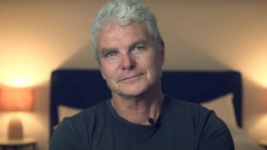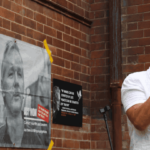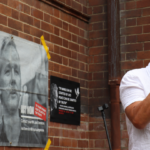McBride Continues to Be the Only One Stewing in Prison Over Afghan War Crimes

Australian Defence Force whistleblower David McBride continues to be the only individual in prison with a connection to Australian war crimes allegedly perpetrated by this nation’s special forces (SAS) troops in Afghanistan over the course of Australia’s participation in the US-led war within the Central Asian country: the longest war Australia has ever seen.
McBride has now served 8 months of a draconian prison sentence handed down by ACT Supreme Court Justice David Mossop on 14 May last year, which comprises of an overall 5 years and 8 months imprisonment, with non-parole not available until after serving 2 years and 3 months.
The lawyer embarked on two tours in Afghanistan as an ADF legal officer over 2012 and 2013.
However, he took issue with the manner in which ADF leadership was conducting operations in relation to the war, so he made an official complaint to his seniors. But after they failed to act upon his disclosure, McBride commenced on an 18 month whistleblowing mission in March 2014 that involved copying 235 classified documents and presenting them to ABC journalists.
The stark anomaly that surrounds the father-of-two’s case is that spurred by the rumours that were circulating about Australian troops in Afghanistan breaching the norms of international law, the government commissioned an official inquiry into them in May 2016, which recommended the AFP investigate 39 alleged murders of Afghan civilians and prisoners of war in respect of 19 ADF troops.
Yet, as McBride’s 3 March 2025 appeal of his sentence draws nearer – and the lawyer continues to be seeking funds to ensure this goes ahead – the public continues to question why only one of the 19 soldiers indicated by Brereton has been charged in relation to an incident, yet since that happened in March 2023, nothing else besides David’s imprisonment has transpired in relation to these matters.
Blocked at every step
McBride is being detained in the ACT’s Alexander Maconochie Centre, after having been railroaded by the Australian authorities at every step of the prosecutorial process that commenced with his 5 September 2018 arrest and continued right up until Justice Mossop sealed his fate last May.
Indeed, the Australian Defence Force and the Australian government were none too pleased with McBride having blown the whistle in such a manner that it exposed multiple alleged SAS war crimes that were set out in 2017’s The Afghan Files report.
The documents he exposed contained evidence of at least 10 potentially unlawful killings of unarmed Afghan adults and children.
As an ADF legal officer, McBride had been charged with teaching troops the rules of engagement, along with the content of the Public Interest Disclosure Act 2013 (Cth).
The PID Act was passed by our current attorney general Mark Dreyfus in 2013, when he first held the office. And this legislation serves to guide public service officers, who are privy to government wrongdoing, on how to blow the whistle.
McBride took issue with what he considered to be the unethical and harmful culture amongst the ADF leadership and how this was being reflected on the ground, and he complained about this to his military superiors, which was done in accordance with the legislated steps set out in the PID Act.
Once nothing came of the internal disclosure, McBride then took the matter to the public broadcaster. However, the ABC journalists didn’t run with the issue McBride was attempting to raise, which involved the illegitimate prosecutions of Australian troops, but rather they focused on SAS perpetrated war crimes.
McBride was then charged with five serious criminal offences, and he sought to argue his defence under the PID Act in the ACT Supreme Court, which would involve his disclosure to the press being in the public interest, as well as being an act undertaken after all over avenues had been exhausted, which would then trigger the criminal immunity contained in section 10 of the legislation.
However, not only was the prosecution going to contest the court permitting either of his two witnesses to testify on his behalf, but when he fronted up to court on 27 October 2022, the government had applied a last-minute public interest immunity order claim, which meant the prosecution could remove any of McBride’s evidence. So, the defence determined not to proceed.
David was then met with much the same approach when he went to trial. In November 2023, the lawyer sought to put a defence asserting that he’d been doing his duty as a military officer in blowing the whistle, however this was again denied by the court, with Justice Mossop countering that “there is no aspect of duty that allows the accused to act in the public interest contrary to a lawful order”.
Then a week into the trial, the government was granted another order that permitted it to bundle up a large swag of McBride’s evidence and remove it from the courtroom never to be seen again. This once more, left David with no real option to argue his defence, and instead he entered guilty pleas in regard to three of the five charges against his name.
Silencing the truth-teller
The November 2020 Brereton report was the document produced by the official government inquiry, which identified 19 unnamed individuals that it recommended be investigated by the Australian federal police in relation to potential unlawful killings in Afghanistan.
The only individual to have been subsequently charged is ex-SAS officer Oliver Shultz. Having been arrested on 20 March 2023, Schultz is currently facing one count of the war crime of murder, in relation to the killing of Dad Mohammad, in a wheat field in Afghanistan’s Uruzgan Province, and he’s currently out on bail.
David McBride, on the other hand, is in prison in relation to having exposed similar war crimes in Afghanistan. And he’s serving his long stretch as he attempted blow the whistle on a series of prosecutions of SAS soldiers, his clients, as he considered the criminal law standard of reasonable suspicion had not been met in these cases.
The initial issue that led to his seeking to expose these illegitimate prosecutions was then Chief of the Defence Force David Hurley announcing that the rules of engagement, or the protocols governing soldier behaviour in the theatre of war, needed to be changed.
On questioning why this was the case, McBride was provided with multiple incident reports from Afghanistan that were supposed to convey why the rules of engagement should be altered, but the lawyer didn’t consider these cases warranted any changes. And he too found that ADF investigators were intervening to prosecute the soldiers implicated, regardless of the lack of substantial proof.
So, David then raised his concerns about these unlawful investigations, as is required of any Australian lawyer.
After all this railroading, McBride pleaded guilty in November 2023, to one count of theft, contrary to section 131.1 of the Criminal Code Act 1995 (Cth), which carries up to 10 years, as well as to two counts of unlawfully communicating defence information, contrary to section 73A of the Defence Act 1903 (Cth), which carries, on indictment, a fine of any amount or prison term of any length.
Deterring disclosures
McBride is the victim of a system that encourages public service officers to blow the whistle and has, over the last decade, had laws encouraging this, because it is in the public interest to have government departments and agencies running in a manner that is above board.
However, this same system, continues to harshly punish these same whistleblowers because it is not in the government interest to have its wrongdoing exposed, as not only is it a bad look, but corruption can be beneficial to those in power.
The truth of the matter is that Dreyfus’ PID laws have not saved any one in McBride’s position. The only discloser to have actually made it to court to put their defence under these laws is ATO whistleblower Richard Boyle, who was found protected in exposing wrongdoing to the press on arguing his PID defence, but he’s now facing 24 criminal charges for the preparatory acts he took.
As the former Morrison government was overseeing three highly-unpopular high-profile whistleblower prosecutions in 2021, Dreyfus told the Canberra Times in November that year that if he was elected back into office, as attorney general, he’d be overhauling the PID Act, as he admitted the laws within it were lacking.
Dreyfus progressed a first round of PID Act reforms in mid-2023, in order to facilitate the running of the National Anti-Corruption Commission (the NACC), however his slated major overhaul of the PID Act has not been progressed. This is despite a November 2023 consultation paper in regard to the “broader stage of reforms”, citing potential amendments that would render Boyle’s acts lawful.
However, in the first month of 2025, with federal Labor about to call an election early this year, it seems highly unlikely that Dreyfus’ major overhaul of whistleblower laws will be progressed by the current AG prior to the vote, which means it may never see light of day.
And this further suggests that for all Labor’s promises and pledges to protect disclosers, that party has successfully avoided progressing laws to protect those who make disclosures about government wrongdoing, so such individuals can continue to have the full force of the law thrown at them on speaking up, because deterrence is paramount for the state, when it comes to whistleblowers.







